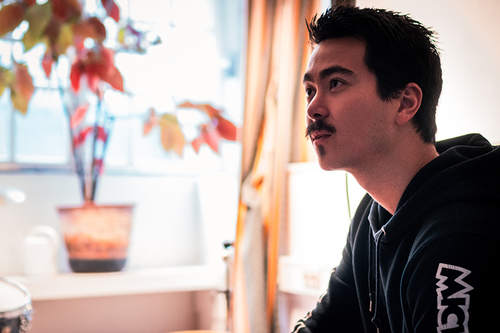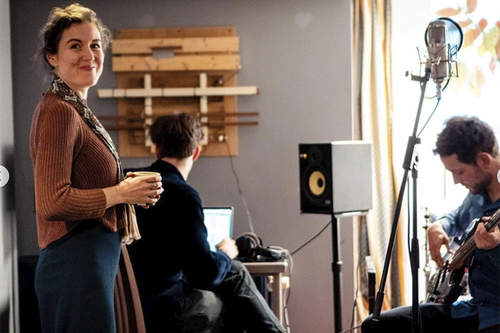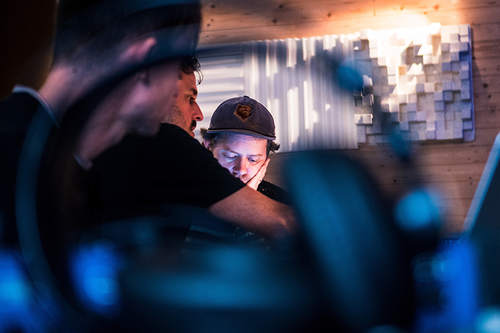Top composers created music for advertising during ADE, with Buma, CTM Publishing and Sizzer organising the two-day "Sync Writing Camp".
A Sync Writing Camp was organized by Buma, CTM and Sizzer in mid-October. While the city was flooded with party-goers attending the Amsterdam Dance Event (ADE), three teams were busy making music for the campaigns of global brands in the basement of the American Hotel.
"Why do I participate?" Is the rhetorical question of Tessa Rose Jackson, a Dutch singer-songwriter with a solid name in the music industry and known for her work for Hunkemöller and Diesel commercials, among others. "I've always written music for advertising. It is very educational. Plus you are also surrounded by colleagues here, so you automatically make new contacts. On top of that, it's just fun."
We are under the American Hotel Amsterdam, countless steps up and down, corridors and staff areas - in a professional sound studio, built for the many musicians who visit the hotel every year. And there, three teams of four made up of producers, composers and singers are busy composing tracks for the upcoming campaigns of car brand Smart and electronics brand Samsung (the commissions were submitted by customers of Sizzer).

Music for moving images
"Our objective is to make it clear wherever possible how important the role of music is in film, advertising, radio, television and games," says Maartje Glas, Manager Buma Music in Motion at Buma Cultuur. "Music is often decisive for the impact of films, games, television series and commercials, and we are happy to help to spread that fact."
Now, for the third time, a Sync Writing Camp has been organised. This edition is led by Seppl Kretz, Senio. Music Producer & Head of Music Production at Sizzer (a global agency and consultant for music on video) and Charlotte Stricker, Sync Manager at CTM Publishing, the largest independent music publishing company in Europe. "These are the events you have to go to if you want to present yourself to composers, brands and the public," say both Stricker and Kretz.
Gut feeling
The reasons that Jackson gives for her cooperation are not dissimilar from those of the other musicians. The change of focus needed in advertising is seen by all as good training. "Whether I write for an artist who plays regular live shows or for a brand, I always do that on the basis of gut feeling," says Tjeerd Bomhof, who we know from 22ghosts, Dazzled Kid and rock band Voicst, and someone who also regularly composes music for commercials. "For this assignment, I am mainly based on the story and the image. But it is always in conflict with the commercial definition of what the brand stands for, and that keeps you sharp."
The Swiss Pablo Nouvelle, a producer and songwriter from London and Zurich and is working strictly to a briefing for the first time, agrees: "We have received a number of well-known songs as a reference. And then you have to make something that sounds like it, but not so that it comes across as a copy. All very inspiring and refreshing."

Emotional change moments
Rose Jackson highlights other aspects of the Buma, Sizzer and CTM Sync Writing Camp. For example, there are several emotional turning points in the commercials and there is still the fact that in the end coherent songs were written that can stand on their own.
Jackson: "I'll just give you a random example. It may well happen in a commercial that within a few tenths of seconds the most important character is first in poor condition, then a fight starts and he ultimately wins. One of the ways to turn it into a single track is not to focus on the changing events in the story, but on the underlying emotions and motives. In this case fear, daring and joy. A writing camp like this forces you to clearly state what you write and why. That is really great."

No rookies
The teams at the American Hotel come from all over the world and are by no means rookies. And the nice thing is, Jackson, Bomhof and Nouvelle agree that they are indeed competing, but also that there is a lot of collaboration. "That is one of the nicer aspects of it," says Bomhof. "You sit close together in that studio room and you hear what the others are doing. You talk about it. You sing something for the others. Everyone grows from that."
And that is exactly the intention, says Glas. Buma wants to be the knowledge, experience and network point in this area of expertise. The two days of "competition" make a major contribution to this. "And for many musicians making commercial music used to be a bit taboo, now it's just a way to get creative with your talent," she continues. "All those who are professionally involved who come to see it are also delighted. In short, it is an event that fits perfectly with our objectives: to emphasise the importance and pleasure of music and communication, among brands and composers."
Written by: Gijs de Swarte
Photos: Digital Madness